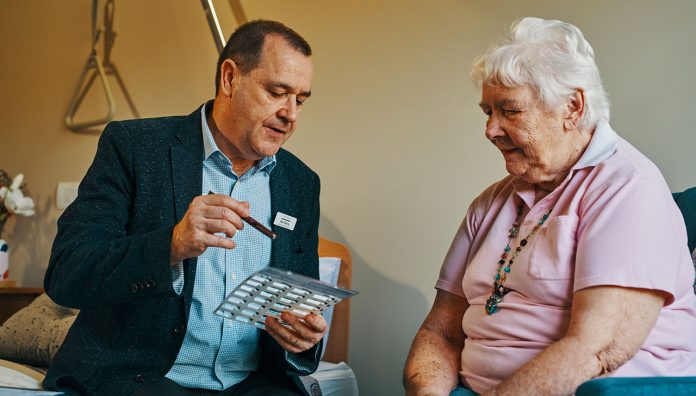Pharmacists can now conduct funded medication reviews via video or teleconference, in a move that will bolster medicine safety as the COVID-19 pandemic continues.
Key points:
|
The Federal Government last week announced that pharmacists can deliver essential medical management consultations – including a MedsCheck, Diabetes MedsCheck, Home Medicines Review (HMR) or Residential Medication Management Review (RMMR) – to eligible patients via telehealth from 21 April [yesterday].
This includes:
- patients aged over 70
- Aboriginal and Torres Strait Islander people aged over 50
- people with chronic health conditions or who are immunocompromised
- parents with new babies
- pregnant women
- and those who meet the national triage protocol criteria for suspected COVID-19 infection.
Accredited pharmacist Andrew Stafford MPS, who was involved in the development of the updated PSA medication management review guidelines, said the changes would help ensure the most vulnerable in the community can remain isolated and still receive a vitally important service.
‘When you compare the patient populations who are at risk of poor outcomes if they contract COVID-19, for example people over 70 and those with chronic conditions such as hypertension and diabetes, to the population who receive HMRs and RMMRs, they marry up,’ he said.
‘Using telehealth, pharmacists can still provide this valuable medicine review service, but remotely, which mitigates a lot of the risk that vulnerable patient populations would face if they visited a pharmacy.’
Remunerated follow-ups added
Pharmacists can also provide two additional HMR and RMMR follow-ups with patients within 9 months of the initial review. This was previously limited to just one review per patient every 24 months.
It helps deliver on recommendations contained in the interim report into the Royal Commission into Safety and Quality in Aged Care, which called for a subsidised process to support pharmacists to participate in case conferencing, monitor residents’ responses to RMMRs and implement medicine management plans.
PSA has been calling for better access to medicine reviews for some time, most recently through its Medicine safety: aged care report.
PSA National President Associate Professor Chris Freeman said allowing multiple follow-ups was essential to support a more effective cycle of care.
With 250,000 hospital admissions each year due to medicine-related problems, he said follow-ups would help ensure patients were properly cared for when it comes to the medicines they are taking, particularly older Australians.
‘As medicines experts it is essential that pharmacists are able to properly review patients’ medications as well as provide advice to other members of the health care team to ensure the safe and quality use of medicines for the elderly,’ he said.
‘At a time when so much attention is given to managing the immediate COVID-19 pandemic, we must not lose sight of the importance of chronic disease management and the safe and quality use of medicines.’
Follow-up reviews are particularly important to help resolve any medicine-related problems sooner, Dr Lisa Kouladjian O’Donnell MPS, Chair of the Accredited Pharmacist Leadership Group, told Australian Pharmacist.
‘In the past, you usually wouldn’t see the patient for another 2 years,’ she said.
‘Some extremely conscientious pharmacists would follow-up anyway, but they weren’t being remunerated for the time and effort they put in to help patients who are vulnerable. This is definitely a welcome change.’
The programs can now also be referred by other medical practitioners, not just GPs, which will allow specialists in aged or chronic care to make a referral if a GP is unavailable.
‘I am proud that our skilled profession will be able to continue its vital role in supporting medicine safety through these medicine review programs,’ A/Prof Freeman said.
‘PSA will continue to work with the government, the aged care sector and other healthcare professionals, residents and families to improve medicine safety in the community.
PSA has updated its practice guidelines to support and reflect current best practice when providing medication reviews. Find them here.












